Pet bills: The people reuniting families with their pets
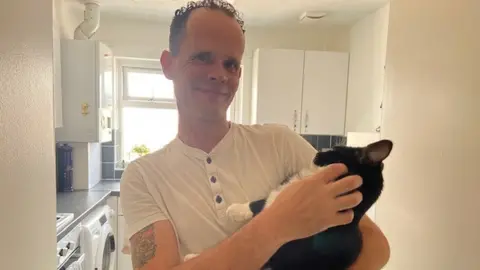 BBC
BBC"I don't know what I would've done. I didn't have any food left for the cats."
Colin Ortutai-Hughes was at breaking point when he turned to animal welfare charity Mayhew.
The 45-year-old father-of-four had already given up his kittens for adoption after moving into his car following the breakdown of his marriage.
He was at risk of also having to lose the kittens' parents, Max and Molly, when the London-based charity stepped in.
"They came out with these massive 5kg bags of cat food, gave us blankets, lent us a box. They were so friendly. They found places for the kittens and said that even if I move, if I get desperate for food I can come back any time," he says.
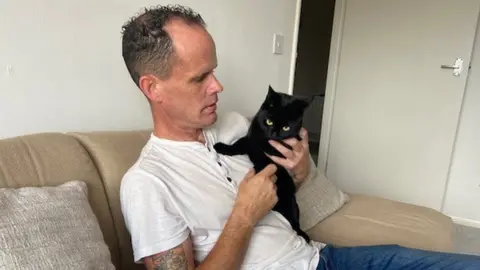
Mayhew is one of many organisations ramping up its services to help pet owners deal with the rising cost of living, which has seen food, fuel and utility bills increase sharply in recent months.
The price of pet food has shot up by more than 20% in a year, says consultancy Kantar - a faster increase than any other product.
Animal charities say they are seeing record numbers of referrals for adoption, including sick or injured pets whose owners no longer have cash for vets' bills.
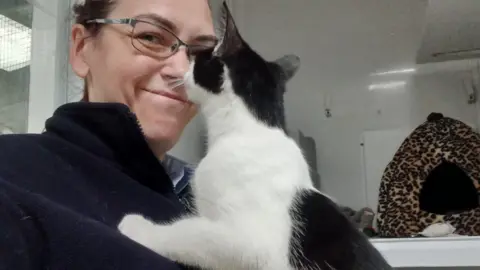 Mayhew
MayhewFor people like Colin, who lives alone and suffers from depression, having an animal to care for can make a huge difference to quality of life.
Georgina Costi, Mayhew's cat welfare coordinator, says helping people keep hold of their pets is the best possible outcome, saying pets are "fantastic for mental health - and we really don't need any more animals coming in for rehoming".
Mayhew has set up a pet refuge - a way for people in crisis to have their animal fostered for up to three months, instead of releasing them for permanent adoption.
"We've had lots of people accessing our refuge scheme. They just wouldn't have gone in to get their operation or into rehab [otherwise], because they don't have finances to put their animal in private boarding," says Georgina.
The charity expects things to get worse, with demand for its pet care packages - with essentials like collars, leads, bowls and pet food - predicted to increase by more than 200% this year in some parts of London.
It has also recently started supplying local food banks with pet food.
'My dogs are my life'
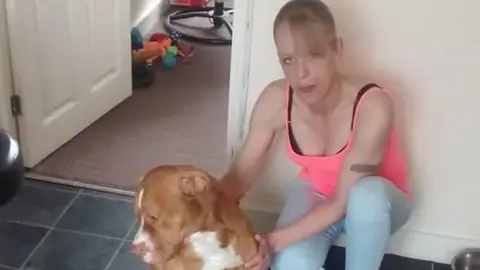 Personal photo
Personal photoJo Lowes, from Redcar, faced having to give up her two dogs - Pitbull, Leo, and Staffordshire terrier, Booboo - after a relationship breakdown and a hospital stay meant having to temporarily move into a property that wouldn't allow pets.
"My dogs are my whole life," she says. "I can't have children. My dogs are like my kids."
Help came in the form of Pauline Wilson, from the National Animal Sanctuaries Support League, who Jo describes as her "saving soldier".
Pauline runs the Alternative Project, in Bishop Auckland, which will take in pets for an average of six months as an alternative to permanent adoption.
She looked after Jo's dogs for about a month - until the 37-year-old could move to suitable accommodation.
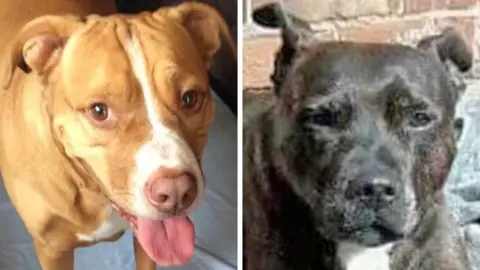 Personal photo
Personal photoPauline says Jo's case is far from unusual. "Lots of people who get in touch are already on the edge. It's particularly hard for children, who face losing their pet as well as their home."
As well as fostering, the Alternative Project also steps in to help with financial and practical resources to keep owners and pets together.
That includes dropping off pet food or hutches to homes, and paying to have animals spayed or neutered.
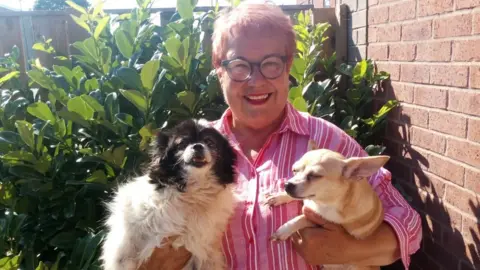 NASSL
NASSLIn some circumstances, people really can no longer look after their pet going forward, Pauline says. But in others, they've are just feeling temporarily overwhelmed by all the costs they face.
The Alternative Project tries to stop animals ending up in sanctuaries, which it says are already "full to bursting".
"It's a dog that's loved - it's laid on your bed, it watches telly with you, it goes out with you and suddenly it finds itself in a kennel. That's heartbreaking. They have emotions just like us.
"Being able to keep that dog in its home is the best for everybody - including the dog."
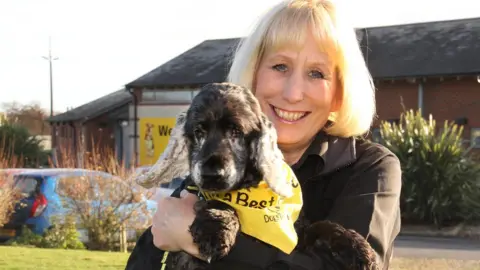 Dogs Trust
Dogs TrustThe Dogs Trust, the UK's largest dog welfare charity, is also being inundated. Enquiries to hand over dogs have hit 1,100 a week. The past fortnight has been the busiest in its history.
For the first time, because of a shortage of places, some of its rehoming centres are asking people to hold on to their animals for a bit longer, if they are able to.
"We've had people bring dogs in because they can't afford the vet treatment or have had road accidents and can't afford the surgery. It's just a cost people can't now afford," says Amanda Sands, the Dogs Trust Leeds centre manager.
"We've had families [come in] who are having to downsize to a flat because they can't afford to stay in their house. It's heartbreaking."
